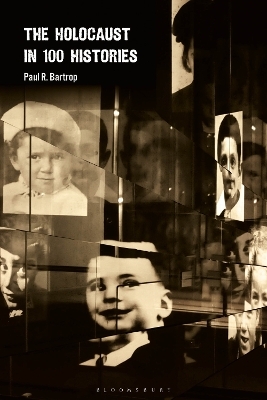
The Holocaust in 100 Histories
Bloomsbury Academic (Verlag)
978-1-350-43511-7 (ISBN)
Paul R. Bartrop shines a light on Nazi perpetrators, Righteous Gentiles who helped save Jews during the Holocaust, Jewish resisters, as well as movements, events, and developments during the Third Reich and the war years. The 100 entries included in the book provide both a series of snapshots and a pathway to understanding how the Holocaust was manifested—or defied —during the years between 1933 and 1945. Its structure enables readers to access the Holocaust in or out of sequence, reading individual entries as appropriate, while the book also contains key primary source documents, further reading suggestions and discussion questions designed to prompt debate and further study.
Paul R. Bartrop is Professor Emeritus at Florida Gulf Coast University, USA. He is the author and co-author of several books, including Resisting the Holocaust: Upstanders, Partisans, and Survivors (2016), Encountering Genocide: Personal Accounts from Victims, Perpetrators, and Witnesses (2014) and Genocide: The Basics (2014). He is also the co-editor, with Michael Dickerman, of the award-winning four-volume The Holocaust: An Encyclopedia and Document Collection (2017) and Resisting the Holocaust: Upstanders, Partisans, and Survivors (2016). Professor Bartrop is a Past President of the Australian Association of Jewish Studies and in 2022 was elected as a Fellow of the Royal Historical Society in the United Kingdom.
Introduction
Part 1 - 1933
Hitler is Appointed
The Reichstag Fire and its Aftermath
The Enabling Act
The April Boycott
The Books are Burning
The Vatican and the Nazis Reach an Agreement
The Haavara Agreement
Part 2 - 1934
The Women’s Führer
The People’s Court
The Night of the Long Knives
The Inspectorate of Concentration Camps
Kurt Daluege and the Nazi Police State
Part 3 - 1935
Genesis of the Nuremberg Laws
Nuremberg Protects Blood and Honour
“Selective Breeding” for a Perfect Race
Part 4 - 1936
August Landmesser’s Very Personal Protest
The Nazi Games
Part 5 - 1937
The Pope’s Declaration
Part 6 - 1938
The Anschluss and the Jews of Austria
A Chinese Diplomat Helps the Jews
Max Schmeling: The Boxer Who Cared
The Evian Conference
“Sarah,” Meet “Israel”
A Swiss Hero at the Border
Munich and the Martyrdom of Czechoslovakia
Kristallnacht: The Point of No Return
Saving the Children
Part 7 - 1939
Hitler Threatens the Jews
Hermann Stöhr, Conscientious Objector
The Rape of Czechoslovakia
The Tragedy of the St. Louis
Child Euthanasia in the Third Reich
War is Declared
The Prescient Words of Chaim A. Kaplan
Aktion T-4 Commences
Friedrich Übelhör Establishes the Lódz Ghetto
Part 8 - 1940
A Tale of Two Januaries
The Shanghai Ghetto
Hitler Invades France
The Madagascar Plan
Romania’s Anguish
Armée Juive and the Jewish Resistance in France
The Tortured Tale of Jud Süss
The Eternal Jew and its Creator
The Oneg Shabbat Archive
Part 9 - 1941
A Brazilian Rescuer
The February Strike in Amsterdam
Hans Calmeyer, the Dutch Schindler
The Holocaust Comes to Yugoslavia
A Pogrom in Antwerp
Operation Barbarossa
Mikhail Gebelev, Hero of Minsk
Babi Yar, The Fatal Ravine
The Martyrdom of Lubny
A Meeting of Like Minds
Days of Infamy
Part 10 - 1942
The Wannsee Conference
An Unlikely Holocaust Hero
A Young Martyr in the Service of Goodness
Belzec: The Heart of Darkness
Third Reich Justice
A Courageous Swedish Smuggler
Jewish Heroes in the Heart of the Reich
Butchery at Lidice
The Roundup at the Vel’ d’Hiv
The Jews of the Netherlands
A Tormented Nazi Meets a Swedish Diplomat
The Riegner Telegram
The Jews of Belgium Fight Back
The Anguish of Norway’s Jews
Casablanca’s Story without an Ending
Zegota: When Help was Needed
Part 11 - 1943
Resistance in the Warsaw Ghetto
The Sacrifice of the White Rose
Rescuing the Jews of Bulgaria
The Bermuda Conference
The Warsaw Ghetto Uprising
Heinrich Himmler and the End of the Ghettos
Uprising in Treblinka
Brundibaár Opens at Theresienstadt
Denmark and the Rescue of the Jews
Black Sabbath in Rome
Father Bernhard Lichtenberg, Catholic Martyr
Charles Coward, the Count of Auschwitz
Part 12 - 1944
The Invasion of Hungary
Fredy Hirsch, the Children’s Hero
The Vrba-Wetzler Report
The Final Solution Hits the Jews of Hungary
The Passion of Marianne Cohn
Calel Perechodnik and the Jewish Ghetto Police
The Story of Mala Zimetbaum
The Sonderkommando Revolt at Auschwitz
Rabbinerin Regina Jonas
Rudolf Kasztner and the Satmar Rebbe
Part 13 - 1945
Roza Robota and the Heroines of Auschwitz
The Horror that was Gross-Rosen
The Sacrifice of Mila Racine
The Liberation of the Camps
The Poet of the Jewish People
The International Military Tribunal Opens
Documents
Glossary
Chronology
Thematic Bibliography
Index
| Erscheinungsdatum | 16.08.2024 |
|---|---|
| Verlagsort | London |
| Sprache | englisch |
| Maße | 156 x 234 mm |
| Themenwelt | Geschichte ► Allgemeine Geschichte ► 1918 bis 1945 |
| Geschichte ► Teilgebiete der Geschichte ► Militärgeschichte | |
| Sozialwissenschaften ► Politik / Verwaltung ► Politische Systeme | |
| Sozialwissenschaften ► Politik / Verwaltung ► Politische Theorie | |
| ISBN-10 | 1-350-43511-2 / 1350435112 |
| ISBN-13 | 978-1-350-43511-7 / 9781350435117 |
| Zustand | Neuware |
| Haben Sie eine Frage zum Produkt? |
aus dem Bereich


